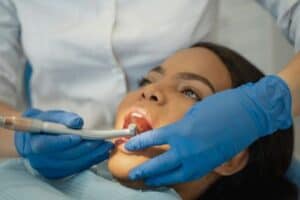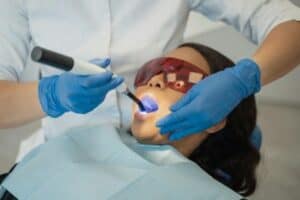
26 Sep The Impact of Stress on Oral Health During the School Year
With each passing school year, students of all ages face mounting pressures that can significantly impact their mental, physical, and oral health. While most people are aware of the general effects of stress, few understand the critical link between stress and oral health. This article will dive deep into how stress during the school year can negatively affect oral hygiene and overall well-being, providing practical solutions to manage both stress and its oral health implications.
Understanding Stress During the School Year
Stress during the school year is an unavoidable challenge for students, educators, and parents alike. The pressure to perform academically, engage in extracurricular activities, and meet social expectations can weigh heavily on students.

Causes of School-Related Stress
Academic Pressure
One of the leading causes of stress for students is academic performance. Homework, tests, and assignments often feel overwhelming, particularly when students juggle multiple subjects. Over time, this constant pressure can trigger physical and emotional responses that harm oral health.
Extracurricular Activities
While extracurricular activities are meant to enhance students’ development, they can sometimes become a source of stress, especially when they clash with academic responsibilities. The resulting exhaustion can affect a student’s ability to maintain good oral hygiene habits.
Social and Peer Pressure
Navigating social dynamics, friendships, and peer pressure can also induce stress. For many students, fitting in or excelling in their social circles can trigger anxiety, which may lead to behaviors like teeth grinding and jaw clenching.
How Stress Affects the Body
Physical Symptoms
Stress impacts the entire body, leading to symptoms like headaches, fatigue, and muscle tension. One lesser-known effect is the toll stress takes on oral health through habits such as teeth grinding (bruxism).
Psychological Symptoms
Anxiety, depression, and mood swings often accompany stress. These mental health challenges can indirectly affect oral health by diminishing a student’s motivation to practice regular hygiene routines.
The Connection Between Stress and Oral Health
Stress and oral health are deeply interconnected, as stress can lead to behaviors and physiological responses that undermine dental hygiene.
Stress-Related Oral Health Issues
Bruxism (Teeth Grinding)
Bruxism is a common response to stress, where individuals grind or clench their teeth, especially at night. Over time, this can lead to worn-down enamel, tooth sensitivity, and even fractures.
Gum Disease (Periodontitis)
Chronic stress weakens the immune system, making the gums more vulnerable to inflammation and infection, which can lead to gum disease.
Dry Mouth (Xerostomia)
Stress can reduce saliva production, causing dry mouth, a condition that increases the risk of cavities and gum disease due to the lack of saliva’s natural cleaning properties.
Immune System Suppression and Oral Health
When the immune system is compromised due to prolonged stress, the body becomes less effective at fighting off infections, including those that affect the gums and teeth. This suppression can accelerate the onset of gum disease and other oral health problems.

Behavioral Effects of Stress on Oral Health
Stress doesn’t just affect the body physiologically; it also changes behaviors, particularly how students approach their oral health.
Poor Oral Hygiene Habits Due to Stress
Neglecting Daily Brushing and Flossing
When stress takes over, students often neglect basic hygiene habits, such as brushing and flossing. The distraction of exams, social pressures, and extracurricular activities can cause students to forget or avoid these crucial routines.
Overeating and Sugary Diets
During stressful times, many students turn to comfort foods, which are often high in sugar. These eating habits can increase the likelihood of developing cavities and gum disease.
Increased Risk of Cavities During Stressful Periods
The combination of poor oral hygiene, dry mouth, and a sugary diet creates the perfect environment for cavities to form. Stress, therefore, significantly raises the risk of dental decay.
Managing Stress to Protect Oral Health
Fortunately, stress can be managed, and its harmful effects on oral health can be mitigated through practical strategies.
Stress Management Techniques for Students
Time Management and Organization
Teaching students time management skills can help them manage schoolwork and personal commitments without feeling overwhelmed. Creating schedules and prioritizing tasks reduces stress and allows students to allocate time for oral care.
Mindfulness and Relaxation Practices
Practices such as mindfulness, meditation, and breathing exercises can help students relax and reduce stress levels. This also reduces the likelihood of engaging in stress-induced behaviors like teeth grinding.
Maintaining Good Oral Health Habits Despite Stress
Establishing a Routine
Maintaining a consistent oral hygiene routine, even during stressful periods, is crucial. Students should brush twice a day, floss daily, and use mouthwash to prevent oral health issues.
Healthy Eating Habits
Incorporating a balanced diet rich in vitamins and minerals will help maintain oral health. Students should be encouraged to limit sugary snacks, especially when feeling stressed.
The Role of Schools and Educators in Reducing Stress
Schools play a vital role in helping students manage stress by fostering an environment that prioritizes mental and physical well-being.
Promoting Mental Health Resources
Schools should offer mental health services, such as counseling and workshops, to support students in managing stress. These services can help students develop healthy coping mechanisms that protect both their mental and oral health.
Encouraging Healthy School-Life Balance
Educators can encourage a balanced approach to academics and extracurricular activities, ensuring that students have enough time for self-care, including oral hygiene.

Long-Term Consequences of Untreated Stress on Oral Health
The longer stress goes unmanaged, the more severe its impact on oral health can become.
Chronic Stress and Long-Term Oral Health Issues
Gum Disease Progression
If left untreated, gum disease caused by stress can progress to more severe stages, eventually leading to irreversible damage
As gum disease worsens, it can lead to periodontitis, where the infection spreads deeper into the gums, causing tissue damage and eventual bone loss. This stage of gum disease is more difficult to treat and may result in tooth loss if proper care isn’t taken.
Tooth Loss and Bone Damage
Stress-induced oral health issues, if neglected, can have long-term consequences, such as tooth loss. When a tooth is lost, the bone that supports it begins to deteriorate, leading to a change in facial structure and the need for more invasive treatments like dental implants or bridges.
FAQs
How can I prevent teeth grinding during stressful times?
To prevent teeth grinding (bruxism), stress management techniques like meditation or breathing exercises can help. Additionally, wearing a night guard while sleeping can protect your teeth from grinding damage.
Is it common for students to develop gum issues due to stress?
Yes, it’s common for students to experience gum problems when they’re stressed, as stress weakens the immune system and can lead to gum inflammation. Coupled with poor oral hygiene habits during stressful periods, this can elevate the risk of gum disease.
What role does diet play in stress-related oral health problems?
Diet plays a crucial role in oral health, especially during stressful periods. Consuming high amounts of sugary foods and drinks can lead to cavities and gum disease. Maintaining a balanced diet rich in vitamins and minerals is essential for keeping teeth and gums healthy.
How can schools support students in managing stress?
Schools can support students by offering mental health resources such as counseling, stress-relief programs, and workshops on time management. By creating a supportive environment, educators can help reduce stress levels and encourage healthy habits, including good oral hygiene.
In Conclusion
Stress during the school year can have a profound impact on oral health, from causing teeth grinding and cavities to increasing the risk of gum disease. By understanding the connection between stress and oral health, students and their families can take proactive steps to manage stress effectively and maintain healthy oral hygiene practices. Schools also play a pivotal role in helping students manage stress through mental health resources and promoting a healthy school-life balance. Through a combination of stress management and proper oral care, students can protect their oral health and ensure a brighter, healthier future.


Sorry, the comment form is closed at this time.